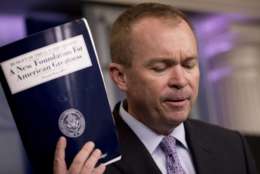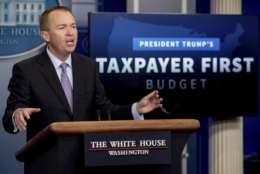federal pay raise
-
Senior Correspondent Mike Causey says that if health premiums jump as expected, folks will have to shop for a lower-cost plan, regardless of a pay raise and COLA.
October 02, 2017 -
Some studies say federal workers are paid 30 percent, less on average, than private-sector workers. Other experts say feds are getting as much as 70 percent more. Who's right?
September 28, 2017 -
The new fiscal year may bring a pay raise and a larger COLA, but it also brings higher premiums. Senior Correspondent Mike Causey says keep your radar up
September 05, 2017 -
In today's Federal Newscast, using lessons learned from Hurricane Katrina, the Justice Department has formed a task force to go after those looking to take advantage of Hurricane Harvey survivors.
September 01, 2017 -
President Donald Trump authorized a pay raise for civilian and military employees beginning Jan. 1, 2018.
August 31, 2017 -
More than 200,000 U.S. Postal Service employees have just received their first two catch-up cost-of-living adjustments, and will soon receive their third COLA.
August 23, 2017 -
The data call requests agencies submit evaluations for positions that receive a rate of pay that differs from the standard General Schedule.
August 08, 2017 -
The Republican Study Committee released its own take on the fiscal 2018 budget, which includes several cuts to federal pay, retirement and health benefits. Here's how the committee's budget proposal measures up to other recommendations from the Trump administration and other House lawmakers.
July 26, 2017 -
The House Appropriations Financial Services and General Government Subcommittee stayed quiet on federal pay in its 2018 bill. Without action from Congress, federal civilian employees would receive a 1.9 percent raise next fiscal year. The appropriations bill also includes significant spending cuts to key priorities at the General Services Administration and Office of Personnel Management.
June 29, 2017 -
Have you read so much about the proposed 2018 budget that you feel like your head will explode? Do you just want to know which provisions would affect you, but are having trouble separating it from all the rest? Federal News Radio has boiled it all down to some key takeaways all federal employees need to know. If you read nothing else about the budget, read this.
May 30, 2017 -
The President's full 2018 budget proposal offers a 1.9 percent pay raise for civilian employees and a 2.1 percent raise to members of the military. But federal employee unions and organizations say the raise does little to undo the damage the President's proposed cuts to federal retirement benefits will have on current employees and retirees and future government workers. The budget also details workforce reductions at some agencies.
May 23, 2017 -
Jeff Neal, former chief human capital officer at the Homeland Security Department, says the issue of federal pay is too complicated to have a simple, one-size-fits-all answer.
May 23, 2017 -
Senior Correspondent Mike Causey says federal and Social Security retirees may be in for a cost-of-living adjustment that’ll trump January's proposed 1.9 percent pay raise for federal workers.
May 23, 2017 -
While the ink on the deal hasn't dried yet, more than 200,000 postal employees could see a series of pay raises down the road, now that one of the major postal unions has reached a provisional labor agreement with the U.S. Postal Service.
May 16, 2017 -
When it comes to the latest proposed pay raise, Senior Correspondent Mike Causey wonders if federal workers are ingrates or just in shock.
May 08, 2017















